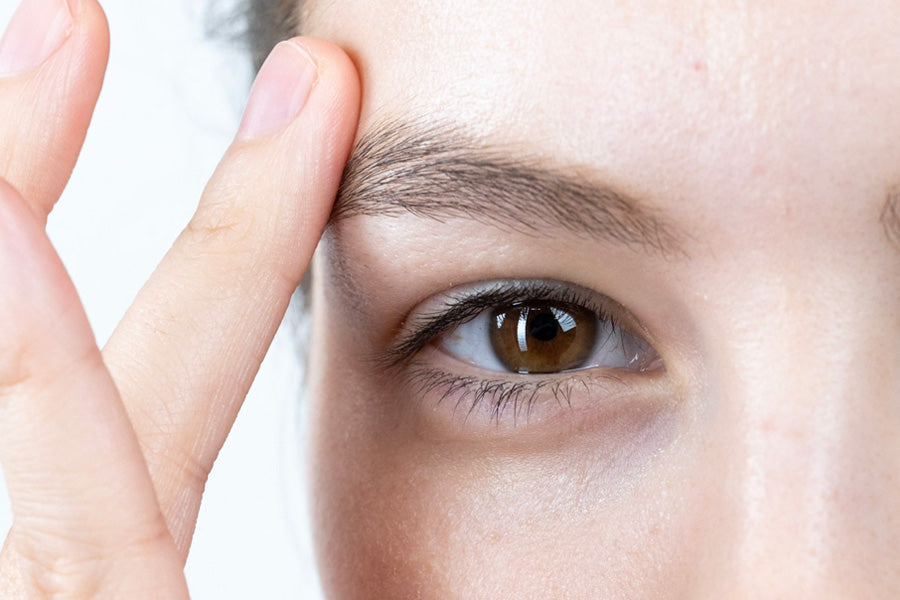Today you will do it up to about 14,000 times . Mostly unconsciously. Maybe even strained. Maybe at this very moment. But certainly many more times before the end of this article: blinking [1].
But the work of your eyes and the delicate skin that surrounds them is far from done by only blinking. Today, you will look intently at screens or the person next to you; possibly squint your eyes protectively if the sun blinds you.
And besides your facial expression, other factors influence how radiant, fresh and well-groomed - or tired, dry and sallow - your eye area looks.
In this article you will learn
- Why the skin around your eyes is special,
- which factors influence the appearance of this area of the skin
plus
Look around (not only into) my eyes and see: That’s why the eye area is special
The top layer of your skin (epidermis) measures just 0.5 mm on average at one of its thinnest points - and is thus up to five times thinner than the rest of the skin on your face. Not to mention other areas of skin, for example on your hands, feet or knees!
In contrast to the rest of your face, there are hardly any sebaceous or sweat glands around the eyes. But it is the sebaceous glands that produce the skin's own lipids to maintain your skin barrier and suppleness. Thus, the eye area is already naturally a little drier than, for example, the forehead of normal or combination skin. In addition, the area under your eyes is not additionally supported by fatty tissue.
Nevertheless, the skin around your eyes is subject to particular stress. And it is not uncommon for it to be (heavily) stressed. It is therefore hardly surprising that signs of premature aging, stress, lifestyle and environmental influences can become apparent here particularly early and particularly clearly.
This affects the eye - These factors influence the appearance of your eye area
Don't pull, don't rub : You've probably read or heard this advice before in connection with maintaining an attractive eye area.
But there are other factors that directly or indirectly affect the skin around your eyes to varying degrees.
Below we present the most important factors. Which of them, if any, do you already take into account in your daily care ritual?
Genetic predisposition
Like your overall appearance, the shape and structure of your eyes is determined to some extent by your genes.
You cannot change your genetic predisposition. But you can "learn from it". Meaning: Observe the skin and its development, especially in your parents or siblings. You may discover indications of possible skin problems that run in your family - allowing you to take countermeasures at an early stage.
Lifestyle, stress and lack of sleep
Too little sleep, a life against your inner rhythm, inflammation-promoting foods as well as constant stress often show up as dark circles or water retention in the face and around the eyes. In addition, collagen breakdown is accelerated by stress and inflammation, which can cause premature wrinkles and lines to appear on the face.
If possible, find daily adjustments that bring these factors back into balance. Exercise, meditation or yoga can help you unwind. Make sure to eat unprocessed foods as often as possible.
Smoking
The toxins in cigarettes prevent your skin from being well supplied with blood, nutrients and oxygen.
This reduced blood circulation often results in a sallow, lifeless complexion and premature wrinkles.
Therefore, avoid smoking as much as possible.
Weather and climate
Very cold winter weather in Germany leaves its mark on your face, as do dry, hot summer days in North Africa. Seasonal conditions, such as pollen counts, can also weaken the skin barrier around your eyes, causing them to become rough more quickly.
Protect your skin with rich (lipid-containing) creams, especially in winter, and seek medical or pharmacy advice if you experience watery eyes during hay fever season. As far as summer days are concerned, the following factor does not only apply to your stay in the holiday country:
Sunlight
Hardly any part of the body is exposed to sunlight as often as your face - and therefore, of course, your eye area.
However, sun damage in particular leads to rapid sagging of the skin and to a skin structure that can make you look older overall.
So, whether it's summer or winter, in Germany or abroad, make sure you apply sunscreen with a sun protection factor of at least 30 every day.
You can find out more about sunscreen and how to apply it properly in our article on summer beauty myths .
Dehydrating make-up products
Long-lasting concealers or camouflage products to hide dark circles can be particularly hard on the delicate skin around your eyes. The particularly long-lasting formulation of these textures often dries out this area of the skin even more.
If possible, create a good foundation with the right care for your eyes, apply as little product as possible and make sure to use the gentlest possible cleansing products when removing make-up.
Incorrect care and aggressive cleaning
Hot water, the use of make-up remover wipes alone, too strong mechanical exfoliation (for example, exfoliation with peeling grains) or soaps should not be part of your eye care.
All four of these factors can damage your skin barrier and encourage or even exacerbate dehydration.
Age
The older you get, the more prone your skin is to dry patches, especially around the eyes. This is especially true for pre-menopausal and menopausal women.
Combine lipid and moisturising products to suit your skin's needs.
Skin diseases
Skin conditions that cause flaky skin often affect the appearance of the eye area. These include neurodermatitis, psoriasis, dermatitis and the development of eczema.
The most common consequences include a dry, sometimes scaly eye area, premature eye wrinkles and dryness lines, dark circles, puffiness and sometimes bags under the eyes. Over time, the area around the upper and lower eyelids also slackens, with excessive, unprotected sun exposure in particular causing a loss of elasticity and tone.
5 reasons why you should use eye care...
Even though you can use a good face cream to care for your eye area - as long as the compatibility and care effect of the product take into account the needs of your skin around the eyes - there are 5 reasons that speak for the targeted care of the eyes with an eye care product consisting of eye cream, eye gel or eye serum.
You want extra protection from free radicals and environmental stress in your skincare.
As long as it is rich in potent antioxidants, your eye care (whether eye gel, serum or cream) can intensively support the delicate skin in its fight against free radicals. The same goes for protection against environmental stress. Both lead to premature lines and wrinkles as well as a sallow complexion.
The newcomers among the hero ingredients in eye care include red ginseng and jiaogulan , which are particularly potent in enhancing the formulations with care classics such as caffeine or hyaluronic acid .

You want to improve the overall appearance of your skin texture
An eye cream or gel can help you improve the overall appearance of the skin texture around your eyes. The drier an area of skin appears, the older and more depleted it looks.
Well nourished and hydrated, you will not only significantly remodel the radiance of the skin around your eyes. You also positively support the general expression of your face through a well-groomed eye area.
You want to care for your eye area according to its needs
As you know by now, the eye area is less nourished by the skin's own oils. For example, if you have oily or combination skin, your eye care needs may differ from the rest of your face. This type of skin often needs more moisture than additional lipids. You may also need an anti-inflammatory treatment to reduce blemishes.
And if you have dry skin in general, your eye area may require extra lipidic care to get rid of wrinkles.
Watch your skin closely and choose skincare that matches the area to either maintain or, if desired, improve the current skin condition.
You want to reduce the appearance of puffiness
Early studies have shown that ingredients such as caffeine can help reduce the appearance of puffiness to some extent.
According to studies, this is due in part to the fact that caffeine applied to the skin stimulates blood flow even in the fine capillaries. It can also help reduce swelling and neutralise free radicals. At the same time, caffeine slows down the breakdown of your skin's collagen framework.
Swelling caused by fatigue, lack of sleep, short-term water-binding diets (e.g. very high in salt or sugar) and stress can therefore be significantly reduced in combination with a small lymphatic drainage technique.
Swelling due to water retention or allergies, on the other hand, need to be checked by a doctor. As a rule, you cannot treat these this by cosmetics alone.
You want to visually reduce fine lines
An eye cream can help to treat eye wrinkles and reduce the appearance of crow's feet.
...and when you should not apply an eye cream
It goes without saying that you should not use eye care on an injured area of skin or i n case of an acute (skin) disease or intolerance of ingredients .
But there are two other key reasons why you should think carefully about what you want from an effective eye care product - and whether the possible effect is what you want.
Eye creams for bags under the eyes
If bags under the eyes are caused by short-term lack of sleep or crying, you have a good chance of improving the appearance of bags under the eyes with cooling, a strengthening eye cream and a light mini-massage.
However, if bags under the eyes are caused by genetics or disease, or are the result of overexposure to UV light at age 50 or older, cosmetic products alone may be able to treat the area. However, you will not be able to reduce the puffiness.
Eye creams for dark circles
The causes of dark circles and their manifestation are manifold.
In addition to lack of sleep, stress, alcohol, cigarettes, (genetic) hyperpigmentation and diseases (for example, of the thyroid gland), a lack of iron and vitamin C can also cause this discolouration under the eyes.
Similar to bags under the eyes, you can only cosmetically reduce dark circles to a limited extent, for example if they are the result of a short-term lack of sleep. In this case, it is important to find a healthy sleep rhythm as soon as possible, reduce stress and, if necessary, take a look at your diet. In addition, you can try to positively support blood circulation by taking care of your eyes.
However, as soon as a genetically determined hyperpigmentation or a disease causes dark circles under the eyes, a medical consultation is indicated.
Conclusion: Naturally, the right care makes your eyes shine especially brightly
Good eye care provides the delicate skin around the eyes with hydrating ingredients as well as nourishing lipids . This helps to prevent premature dehydration and its consequences.
When choosing your eye care, pay attention to the needs of this skin area and also to what you expect from the product. Deep drooping eyelids and pronounced bags under the eyes can be treated, but not cosmetically corrected.
Apply an additional sunscreen to preserve the elasticity and resilience of the skin for as long as possible.
If you don't have any eye care at hand, you can also use facial care if the ingredients allow it to be used near the eyes (keyword: ingredients that "creep" into the eye) and meet the care needs of this area.

